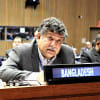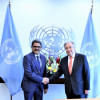9 out of 10 people worldwide breathe polluted air: WHO
Nine out of 10 people breathe air containing high levels of pollutants, shows new data from the United Nations World Health Organization (WHO).
Updated estimations reveal an alarming death toll of 7 million people every year caused by ambient (outdoor) and household air pollution, says a WHO release issued in Geneva today.
Also READ: Dhaka air ranked world's 3rd most polluted
It says, air pollution levels remain dangerously high in many parts of the world.
However, the distribution of the 7 million deaths is largely uneven with the vast majority of the pollution-induced deaths are being taking place on poorer countries.
More than 90 percent of air pollution-related deaths occur in low- and middle-income countries, mainly in Asia and Africa, followed by low- and middle-income countries of the Eastern Mediterranean region, Europe and the Americas, says WHO, which will convene the first Global Conference on Air Pollution and Health from October 30 to November 1 this year to bring governments and partners together in a global effort to improve air quality and combat climate change.
WHO is the custodial agency for the Sustainable Development Goal Indicator to substantially reduce the number of deaths and illnesses from air pollution by 2030 (SDG 3.9.1).
"Air pollution threatens us all, but the poorest and most marginalized people bear the brunt of the burden," says Dr Tedros Adhanom Ghebreyesus, Director-General of WHO. "It is unacceptable that over 3 billion people - most of them women and children - are still breathing deadly smoke every day from using polluting stoves and fuels in their homes. If we don't take urgent action on air pollution, we will never come close to achieving sustainable development."
WHO estimates that around 7 million people die every year from exposure to fine particles in polluted air that penetrate deep into the lungs and cardiovascular system, causing diseases including stroke, heart disease, lung cancer, chronic obstructive pulmonary diseases and respiratory infections, including pneumonia.
Ambient air pollution alone caused some 4.2 million deaths in 2016, while household air pollution from cooking with polluting fuels and technologies caused an estimated 3.8 million deaths in the same period.
Around 3 billion people - more than 40 percent of the world's population - still do not have access to clean cooking fuels and technologies in their homes, the main source of household air pollution. WHO has been monitoring household air pollution for more than a decade and, while the rate of access to clean fuels and technologies is increasing everywhere, improvements are not even keeping pace with population growth in many parts of the world, particularly in sub-Saharan Africa.
WHO recognizes that air pollution is a critical risk factor for non-communicable diseases (NCDs), causing an estimated one-quarter (24 percent) of all adult deaths from heart disease, 25 percent from stroke, 43 percent from chronic obstructive pulmonary disease and 29 percent from lung cancer.
Over 4300 cities in 108 countries are now included in WHO's ambient air quality database, making this the world's most comprehensive database on ambient air pollution. Since 2016, more than 1000 additional cities have been added to WHO's database which shows that more countries are measuring and taking action to reduce air pollution than ever before.
"Many of the world's megacities exceed WHO's guideline levels for air quality by more than 5 times, representing a major risk to people's health," says Dr Maria Neira, Director of the Department of Public Health, Social and Environmental Determinants of Health, at WHO.
He says, "We are seeing an acceleration of political interest in this global public health challenge. The increase in cities recording air pollution data reflects a commitment to air quality assessment and monitoring. Most of this increase has occurred in high-income countries, but we hope to see a similar scale-up of monitoring efforts worldwide."

 For all latest news, follow The Daily Star's Google News channel.
For all latest news, follow The Daily Star's Google News channel. 








Comments